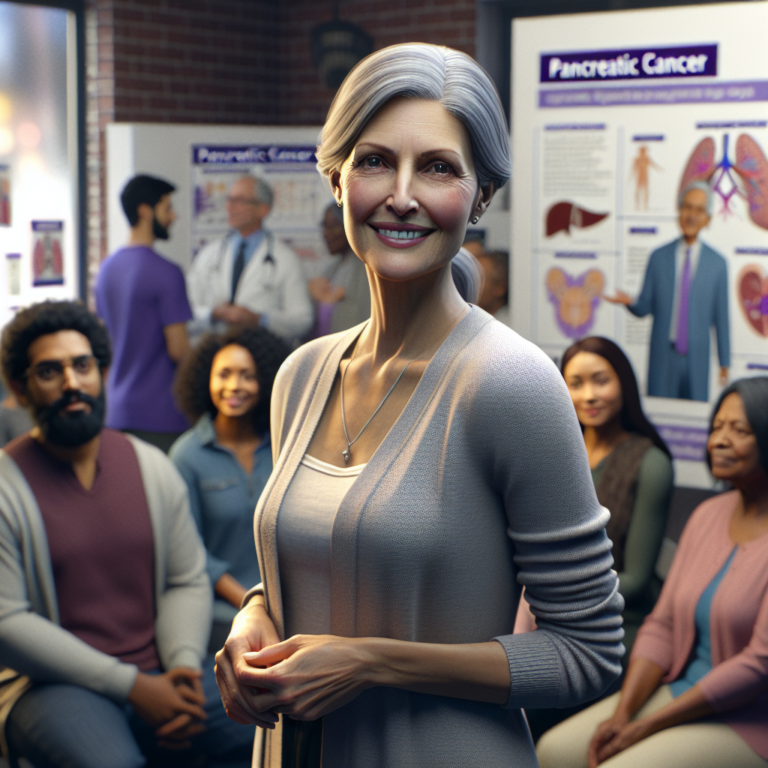United We Stand: The Power of Community Support in Overcoming Challenges

In February 2021, Rhonda Havig, then 50, found herself grappling with troubling symptoms like persistent nausea, fatigue, and alarming changes in her bodily functions. A simple online search led her to a range of potential health issues, including serious conditions like liver disease and pancreatic cancer. This prompted her to seek medical help, setting off a series of tests that would ultimately lead to a life-altering diagnosis.
The Road to Diagnosis
After undergoing an ultrasound that indicated a distended gallbladder, Rhonda was referred to a surgeon. However, the surgeon suspected the gallbladder wasn’t the root of her problems and requested an MRI. With an appointment already scheduled with gastroenterologist Dr. Urmee Siraj, Rhonda was fortunate to receive an expedited visit thanks to her surgeon’s intervention.
The MRI revealed a mass located at the head of her pancreas, obstructing her bile duct and likely causing her symptoms. Dr. Siraj ordered further procedures, including an electronic ultrasound (EUS) and endoscopic retrograde cholangiopancreatography (ERCP), to gather more information about the mass. She also referred Rhonda to Dr. James Ouellette, a renowned surgical oncologist in Dayton, Ohio, specializing in pancreatic issues.
Dr. Ouellette’s team, including Dr. Mustafa Musleh, performed the EUS and successfully biopsied the mass. However, due to the blockage, a stent couldn’t be placed in the bile duct, necessitating Rhonda’s admission to Miami Valley Hospital for a biliary drain.
The Long Wait for Answers
While hospitalized, Rhonda had discussions with Dr. Ouellette regarding the Whipple procedure, a major surgery to treat pancreatic cancer. Medical oncologist Dr. Ketan Shah also discussed chemotherapy plans pending test results. At this point, Rhonda had yet to receive a definitive diagnosis.
The biliary drain, inserted by Dr. Robert Tyrrell, involved a flexible tube that connected her liver to an external pouch, collecting excess bile. This new reality became a topic of her blog, where she documented her experiences and feelings.
A Family Legacy of Cancer
On March 24, 2021, the biopsy results arrived, confirming Rhonda’s fears: she was diagnosed with pancreatic adenocarcinoma. This news, while devastating, wasn’t entirely unexpected due to her family history—both her grandfather and one of his brothers had battled the disease. Genetic testing revealed no mutations, making her family history her only identifiable risk factor.
Though she initially applied for a clinical trial, Rhonda was disqualified due to the tumor’s proximity to a major vein. Ultimately, she and her medical team agreed that surgery and chemotherapy would be the most effective treatment plan.
Surgical Intervention and Chemotherapy
On April 27, 2021, Rhonda underwent the Whipple procedure at Miami Valley Hospital. Post-surgery, biopsies indicated clear margins around the tumor, and out of 15 lymph nodes removed, only two contained cancer cells. This led to a diagnosis of stage IIb, prompting a follow-up plan involving chemotherapy.
Under the guidance of Dr. Shah, Rhonda embarked on six cycles of chemotherapy using gemcitabine and capecitabine. Despite battling nausea, fatigue, and hair loss—along with the painful hand-foot syndrome—she communicated closely with Dr. Shah, who adjusted her treatment to alleviate side effects, enabling her to maintain a decent quality of life.
A Moment of Relief
On December 8, 2021, Rhonda underwent scans that would determine the effectiveness of her treatment. The results brought tears of joy: there was no evidence of recurrent or metastatic disease. Fast forward to May 2023, and she continues to celebrate clear scans, more than two years post-diagnosis.
Sharing Her Journey Through Blogging
In the wake of her diagnosis, Rhonda sought a way to inform her friends and family about her health without repeating herself endlessly. Thus, she turned to blogging, finding it to be a more manageable outlet than verbal updates. This decision not only allowed her to share her journey but also connected her with other survivors, fostering a sense of community.
Reading stories from fellow survivors on platforms like Let’s Win Pancreatic Cancer provided her with hope and motivation. Rhonda found strength in the knowledge that she wasn’t alone in her battle against this formidable disease.
A Call for Support
Throughout her journey, Rhonda has been bolstered by the unwavering support of her family, friends, and dedicated medical professionals. She encourages anyone facing pancreatic cancer to reach out for help, whether from loved ones, healthcare providers, or online support groups. Rhonda reassures fellow warriors that even when it feels like they are fighting alone, there exists a vast network of survivors holding them in their thoughts and hearts.






